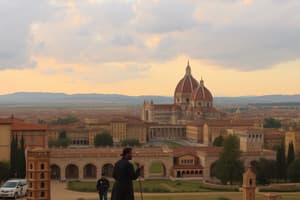Podcast
Questions and Answers
Define 'Renaissance'.
Define 'Renaissance'.
- An explosion of creativity in art, writing, and thought. (correct)
- A period of decline in creativity.
- The rebirth of classical learning.
- None of the above.
Where did the Renaissance start?
Where did the Renaissance start?
Northern Italy
How long did the Renaissance last?
How long did the Renaissance last?
From 1300 A.D. to 1600 A.D.
What is a city-state?
What is a city-state?
What effects did the Bubonic Plague have?
What effects did the Bubonic Plague have?
Why did merchants become wealthy around this time?
Why did merchants become wealthy around this time?
Who were the Medici?
Who were the Medici?
What languages did scholars read?
What languages did scholars read?
Where did scholars move after the fall of Constantinople in 1453?
Where did scholars move after the fall of Constantinople in 1453?
Define 'humanism'.
Define 'humanism'.
Define 'secular'.
Define 'secular'.
What did the wealthy enjoy?
What did the wealthy enjoy?
Define 'patron'.
Define 'patron'.
Who would have been patrons?
Who would have been patrons?
What is a 'Renaissance Man'?
What is a 'Renaissance Man'?
Who wrote 'The Courtier' in 1528?
Who wrote 'The Courtier' in 1528?
What lesson did 'The Courtier' teach?
What lesson did 'The Courtier' teach?
What were Renaissance women expected to do?
What were Renaissance women expected to do?
What did artists most commonly paint?
What did artists most commonly paint?
What is 'perspective'?
What is 'perspective'?
What was a favorite subject among sculptors?
What was a favorite subject among sculptors?
What form did sculptures take in this era?
What form did sculptures take in this era?
Who was Leonardo Da Vinci?
Who was Leonardo Da Vinci?
What did Da Vinci paint?
What did Da Vinci paint?
What was Raphael famous for?
What was Raphael famous for?
What was Raphael's favorite subject?
What was Raphael's favorite subject?
Who was the first female artist to gain renown?
Who was the first female artist to gain renown?
Define 'vernacular'.
Define 'vernacular'.
Why did writers turn to their vernacular language?
Why did writers turn to their vernacular language?
Who is Boccaccio?
Who is Boccaccio?
What is 'The Prince'?
What is 'The Prince'?
What did female authors write about?
What did female authors write about?
Flashcards are hidden until you start studying
Study Notes
Definition of Renaissance
- An explosion of creativity in art, writing, and thought between 1300 A.D. and 1600 A.D.
Origins of the Renaissance
- Began in Northern Italy and marked the rise of city-states like Florence and Rome.
Impact of the Bubonic Plague
- Caused the death of 60% of Europe's population, leading to economic disruption and shifts in societal values.
Rise of Wealthy Merchants
- Post-plague, a focus on worldly goods emerged, increasing demand for luxury items from merchants.
Medici Family Influence
- The Medici were a powerful banking family that governed Florence, significantly impacting politics and culture.
Scholar's Language
- Renaissance scholars predominantly studied Greek and Latin manuscripts, enhancing classical knowledge.
Migration of Scholars
- Following the fall of Constantinople in 1453, many scholars relocated to Rome, fostering a cultural revival.
Humanism
- An intellectual movement that emphasized human achievements and the value of individual contributions rather than solely divine creation.
Concept of Secularism
- Refers to attitudes and activities that are worldly and non-religious in nature.
Luxurious Lifestyles of the Wealthy
- Wealthy individuals enjoyed fine foods, large homes, and elaborate clothing as symbols of status.
Role of Patrons
- Patrons, often church leaders and affluent merchants, financially supported the arts, enabling cultural flourishing.
The Renaissance Man
- Refers to a well-rounded individual skilled in various fields, including the arts, politics, and science.
"The Courtier" by Baldassare Castiglione
- A guidebook published in 1528 that outlines how to become the ideal 'universal' person in society.
Expectations of Renaissance Women
- Women were primarily expected to inspire art and maintain beauty, with limited roles in cultural production.
Common Subjects in Art
- Artists often focused on realistic portrayals of religious themes, bringing depth to spiritual subjects.
Artistic Technique: Perspective
- Perspective is an innovative technique used to create the illusion of three dimensions on a flat canvas.
Sculpture Trends
- Sculptors favored natural postures and expressions, often depicting biblical figures, with David as a popular subject.
Contributions of Leonardo da Vinci
- Recognized as a pioneer of the Renaissance, Da Vinci excelled in multiple disciplines, famously painting "Mona Lisa" and "The Last Supper."
Raphael's Legacy
- Raphael was renowned for his mastery of perspective and notable works such as "School of Athens."
Sofonisba Anguissola's Achievement
- Renowned as the first female artist to gain recognition in a predominantly male-dominated field.
Vernacular Writing
- The term 'vernacular' refers to the native language of a region, which became widely used in literature during the Renaissance.
Reasons for Vernacular Use
- Writers turned to vernacular to enhance self-expression and highlight individuality in their works.
Boccaccio's Notable Work
- Boccaccio authored "Decameron," a collection of stories with bawdy themes that reflect societal attitudes.
"The Prince" by Niccolò Machiavelli
- A pivotal political guidebook analyzing how rulers can effectively gain and maintain power.
Focus of Female Authors
- Female writers often expressed personal feelings in their works, diverging from mainstream political topics.
Studying That Suits You
Use AI to generate personalized quizzes and flashcards to suit your learning preferences.




